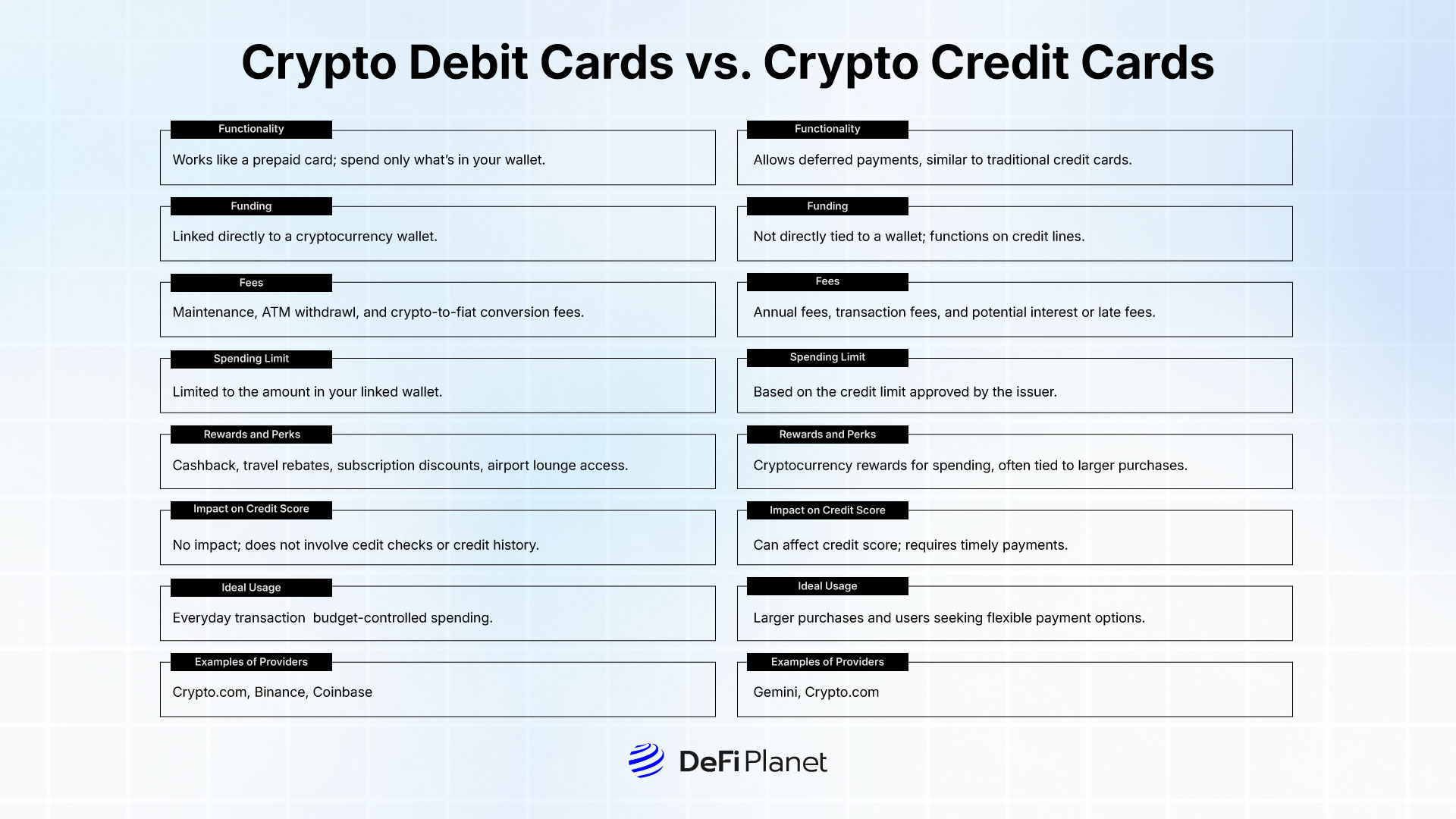Last updated on March 4th, 2025 at 12:52 pm
Most crypto exchanges offer their customers “crypto debit cards” as one of the ways they access and spend their crypto assets. These cards, which are often powered by global payment giants such as Visa and Mastercard, are one of the few ways crypto has found a solid way to be integrated into everyday life.
This innovation is more than just a convenience; it’s a critical step in driving crypto adoption worldwide. By eliminating the need for manual conversions and simplifying transactions, crypto debit cards make digital currencies more practical and accessible to mainstream users.
In this article, we’ll explore how crypto debit cards work, their unique benefits, and how they compare to crypto credit cards.
How Crypto Credit Cards Work
Crypto debit cards operate like traditional payment cards but are directly connected to a user’s cryptocurrency wallet. When a purchase is made, the card converts crypto to fiat currency in real-time, allowing users to pay for goods and services at any location that accepts standard debit or credit cards.
The top centralized crypto exchanges like Binance, Coinbase, Crypto.com, and BitPay have introduced crypto debit cards supported by global payment networks, ensuring widespread acceptance. Whether you’re shopping locally or traveling internationally, these cards allow you to spend your digital assets with ease, while offering the familiarity of traditional financial tools.
Crypto Debit Cards vs. Crypto Credit Cards
Crypto debit cards and crypto credit cards serve distinct purposes and cater to different spending preferences.
Crypto debit cards function similarly to prepaid cards, requiring users to link a cryptocurrency wallet to fund payments and withdrawals. These cards are ideal for everyday spending, allowing users to only spend what is available in their wallet. However, they often come with fees, such as ATM withdrawal charges, annual or monthly maintenance fees, and conversion fees for exchanging cryptocurrencies into fiat.
Despite the fees, many providers offer enticing perks like cashback rewards, airport lounge access, travel rebates, and subscription discounts. For instance, Crypto.com credits cashback rewards in its native cryptocurrency, Cronos (CRO), adding value to everyday transactions.

On the other hand, crypto credit cards operate much like traditional credit cards, offering the ability to defer payments for a set period. These cards are more suited for larger purchases, providing flexibility and rewards, such as earning cryptocurrencies for every transaction.
However, they come with potential drawbacks, such as interest charges, late fees, and the possibility of affecting your credit score if balances are not cleared on time. Users must understand the terms and conditions to avoid unexpected costs.
While crypto debit cards prioritize simplicity and budget control, crypto credit cards provide greater purchasing power and rewards for those comfortable managing credit. Both options play a significant role in enhancing the usability of cryptocurrencies in everyday transactions, but the choice ultimately depends on individual financial habits and spending needs.
How to Get Started with a Crypto Debit Card
Getting started with a crypto debit card is straightforward and allows you to bridge your digital assets with real-world spending. Follow this step-by-step guide:
Research Available Providers
Begin by researching the different crypto debit card providers, such as Crypto.com, Binance, or Coinbase. Compare their offerings based on fees, rewards, supported cryptocurrencies, and geographic availability to find the one that best fits your needs.
Sign Up and Complete the KYC Verification
Once you’ve chosen a provider, sign up by visiting their website or app. During registration, you will need to complete Know Your Customer (KYC) verification. This process typically requires you to upload a government-issued ID and, in some cases, proof of address, ensuring compliance with regulatory standards.
Fund Your Crypto Debit Card
After your account is verified, fund your card by transferring cryptocurrency from your wallet. Ensure that the provider supports your preferred digital assets. Some platforms may also allow you to buy cryptocurrency directly through their interface, streamlining the funding process.
Start Using Your Card
Once the card is funded, you can use it for purchases, both online and in-store, or withdraw cash from ATMs. The card will automatically convert your cryptocurrency into fiat currency at the point of sale.
By following these steps, you’ll be well-equipped to integrate a crypto debit card into your daily financial routine, enabling seamless and convenient spending of your digital assets.
Factors to Consider When Selecting a Crypto Debit Card
In addition to ensuring that the card supports the cryptocurrencies you frequently use, there are a number of factors you consider before making choice of which crypto debit card to get.
Fees (Transaction, Withdrawal, Maintenance)
Evaluate the various fees associated with the card, including transaction fees, ATM withdrawal charges, maintenance fees, and currency conversion costs. Comparing these fees across providers can help you find a cost-effective option.
Global Acceptance and Supported Regions
Verify whether the card is accepted internationally and in regions where you frequently shop or travel. Look for compatibility with global payment networks like Visa or Mastercard, which ensure broader acceptance at merchants and ATMs worldwide. Additionally, check the fiat currencies available for conversion and spending, particularly if you plan to travel or make international transactions.
Card Rewards and Perks
Consider the rewards and benefits offered by the card, such as cashback, discounts on travel bookings, airport lounge access, or subscription rebates. Some cards provide rewards in native tokens, adding extra value to your spending.
Security Features and Reputation of the Issuer
Choose a provider that prioritizes security with features like two-factor authentication, PIN protection, and instant transaction notifications. Additionally, research the issuer’s reputation by reading user reviews and checking their compliance with regulatory standards.
By addressing these factors, you can find a crypto debit card that balances convenience, cost-effectiveness, rewards, and security.
Challenges of Using Crypto Debit Cards
While crypto debit cards are becoming more popular, they are not universally accepted by all merchants, especially in regions with limited adoption of cryptocurrencies. Some businesses may not recognize or support crypto payments, requiring users to rely on fiat currency alternatives. This lack of widespread acceptance can reduce the convenience of using crypto debit cards, particularly for international travellers or individuals in less crypto-friendly regions.
Technical challenges are another hurdle for crypto debit card users. Providers may experience system downtimes, transaction delays, or errors in converting cryptocurrency to fiat. These issues can be particularly frustrating during time-sensitive purchases. Moreover, poor customer support or lack of transparent communication from providers can make it difficult for users to resolve such problems efficiently.
Finally, cryptocurrencies operate in a complex and evolving regulatory landscape. Using a crypto debit card may expose users to compliance issues, especially in countries where crypto regulations are unclear or restrictive. Governments may impose taxes, reporting requirements, or even bans on crypto transactions, which could disrupt the usability of these cards. Additionally, changes in regulations could impact card providers, leading to interruptions or limitations in their services.
Tax Implications of Using Crypto Debit Cards
Spending crypto with a debit card can trigger taxable events, as converting crypto to fiat (e.g., USD or EUR) for purchases may result in capital gains tax. If the value of your cryptocurrency has increased since you acquired it, you may owe taxes on the gain when you spend it. For example, spending Bitcoin bought at $5,000 when its value is $6,000 could incur taxes on the $1,000 gain.
Also, crypto tax regulations vary by region. Some countries treat crypto as assets subject to capital gains taxes, while others may tax it as income. For example, the U.S. requires reporting of capital gains when spending crypto, whereas other countries, like Germany, may not tax crypto gains if held for over a year.
So, it’s essential to understand the regulations in your country to stay compliant. This means you will keep detailed records of all crypto transactions. This includes tracking the date, the amount spent, and the value of the crypto at the time of the transaction. Many crypto debit card providers offer transaction history tools, but it’s wise to keep your own records to calculate potential gains or losses accurately.
Final Thoughts
Choosing the right crypto debit card is important to get the most out of it and avoid problems. While these cards make it easy to spend cryptocurrency, there are things to think about, like price changes in crypto, how many places accept them, rules around using them, and security risks.
Before picking a card, check things like what cryptocurrencies it supports, how much it charges in fees, and if it offers rewards. Also, think about how the card fits with your money goals and how you plan to use crypto, whether it’s for shopping, travel perks, or saving for the future.
In the end, making a smart choice will help you use your crypto debit card well, and handle both the benefits and challenges. Take your time, think about what you want from the card, and choose one that fits your needs.
Disclaimer: This article is intended solely for informational purposes and should not be considered trading or investment advice. Nothing herein should be construed as financial, legal, or tax advice. Trading or investing in cryptocurrencies carries a considerable risk of financial loss. Always conduct due diligence.
If you would like to read more analyses like this, visit DeFi Planet and follow us on Twitter, LinkedIn, Facebook, Instagram, and CoinMarketCap Community.
Take control of your crypto portfolio with MARKETS PRO, DeFi Planet’s suite of analytics tools.”




















